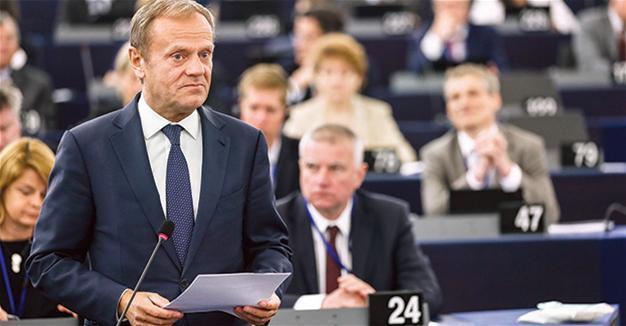EU offers ‘fairness’ to Britain in Brexit talks
STRASBOURG - Reuters

European Council President Donald Tusk, who will oversee the negotiations that will take Britain out of the EU, said on May 17 he wanted other member states to be fair towards London, while retaining their unity.
“What was and remains most important for me, is that our conduct in these talks will show the European Union at its best: in terms of unity, political solidarity and fairness towards the United Kingdom,” he told the European Parliament.
Reporting on a summit of the 27 leaders he chaired on April 29, he stressed they would insist on London showing “sufficient progress” in agreeing to EU demands over the rights of European citizens in Britain, outstanding payments and the Irish border before Brussels would open talks on a future trade agreement.
European Commission President Jean-Claude Juncker, whose EU executive will conduct the Brexit negotiations due to start after a British election on June 8, said the bloc was prepared and would work on priorities for its future: “This negotiation is now in the hands of our capable divorce lawyers,” he said, noting his Brexit negotiator Michel Barnier would speak later.
Juncker, who was criticized in Britain after details from a dinner meeting he held last month with British Prime Minister Theresa May were leaked to a German newspaper, said preparations had shown the EU’s unity and “commitment to transparency.”
Nigel Farage, the Brexit campaigner and leader of the UK Independence Party, took Juncker to task over the leak and accused Brussels of trying to “bully” Britain and suggested it could leave the Union without negotiating its withdrawal.
“Either we get some grown-up, reasonable demands from the European Union or the United Kingdom will be forced to walk away before the end of this year. We can’t spend two years with this farce,” Farage told the legislature in Strasbourg.
Under Article 50 of the EU treaty, Britain is due to leave only on March 30, 2019, two years after May filed formal notice of its withdrawal. Officials on both sides have said an earlier withdrawal would not be legal. The two-year period is intended to give time to agree terms but Britain will be out of the Union in 2019 even if it fails to negotiate such an accord.
Both sides have warned that negotiations could fail, though that would create a legal limbo disruptive to both sides.
 European Council President Donald Tusk, who will oversee the negotiations that will take Britain out of the EU, said on May 17 he wanted other member states to be fair towards London, while retaining their unity.
European Council President Donald Tusk, who will oversee the negotiations that will take Britain out of the EU, said on May 17 he wanted other member states to be fair towards London, while retaining their unity.